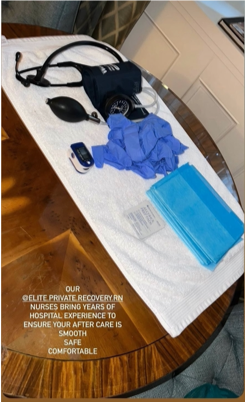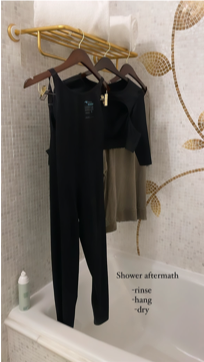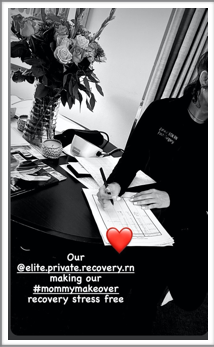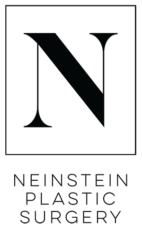By Bronwyn R Sciarrino BSN RN, Founder, Elite Private Recovery & Ciara Geraghty BSN RN, Co-Founder, Elite Private Recovery
The Role of a Private Duty Nurse
Patients often wonder “what is the nurse going to do for me while she is there?”, or “what does having a nurse look like?”
Well, let me start off by saying our goal is to reduce anxiety after surgery to allow you to heal peacefully. Patients are at their most vulnerable after surgery, whether it is elective or not, and we are there to make the recovery process as smooth and as comfortable as possible.
Each nurse is trained to care for the patient specifically to the plastic surgeries offered. In addition, each of us has either previously worked in a critical care setting or still does. This means we are able to safely monitor for any medical emergencies and work with you safely with your medications to ensure comfort.
Fast Facts
- We pick you up from surgery
- We stay awake while you rest
- We handle all medications, drains, and dressings
- We work hand in hand with your surgeon and their team
- We educate you on garments, bathings, creams, ointments, massages, medications
- We help turn something stressful into something enjoyable
A Day in the Life
 Upon arriving to the office, we are brought back to the recovery room to assist the recovery nurse with the remainder of the recovery. We work as a team to place the initial dressings, look for any abnormal swelling, monitor vial signs prior to leaving the office, providing adequate hydration via IV, and assist in getting the initial garment on. After this is completed in the office, the nurse then escorts the patient back to her home or hotel to continue the recovery process.
Upon arriving to the office, we are brought back to the recovery room to assist the recovery nurse with the remainder of the recovery. We work as a team to place the initial dressings, look for any abnormal swelling, monitor vial signs prior to leaving the office, providing adequate hydration via IV, and assist in getting the initial garment on. After this is completed in the office, the nurse then escorts the patient back to her home or hotel to continue the recovery process.
Upon arrival to the hotel in a wheelchair, the nurse lines the bed completely on one side in addition to the carpet if liposuction is done in addition to a tummy tuck. We lay the patient in a “beach chair position” which allows her to not put any stress on her new abdominal incision. Thankfully, an expired block is used so the first overnight is not terribly difficult getting in and out of bed (pain wise). However, there can be fluid shifts within the body which causes lightheadedness, waves of nausea and low blood pressure. We monitor the blood pressure every hour for the first few hours and then gradually decrease the frequency as long as it has been stable. Fluids are encouraged whether it is oral or IV. After all, adequate hydration assists in a safe and easier recovery.

The first night, the patient typically needs to go to the bathroom every 1-2 hours. This is called diuresing (an increased excretion of urine). This is the body ridding all the fluid that was given during surgery and in recovery. Now, unfortunately for every bathroom break, you will be told to drink more water, by yours truly. I know, I know, this is so annoying because then you have to keep getting up and have to continue we using the bathroom. BUT, if you do not replace the fluid that has left your body in this initial post op phase you will be come very dehydrated and that can cause an unsafe situation.
The next day is when the patient begins to feel most everything. The block is wearing off. We need you to walk every two hours. This too is typically shower day which I call “an event.” The initial garment comes off, which you will not be able to do on your own, all the dressings are removed from your body and we will make sure you feel well enough to safely shower. This first shower is not a long, hot, steamy shower. It is rather a rinse off to feel clean. Patients often times can feel clammy and nauseous with their first shower. This is normal from fluid shifts in the body and that is again why it is so important to have a nurse with you. After the shower it is again time to dress the incision(s) and replace the garment.
 Post op days 2-4 look the same as above, however a couple of those days may be easier than others. In addition to above, the entire time we are with you, we manage your medications and make a mediation chart for you, manage your jackson pratt drains (which you will have), create an appropriate diet for you and most importantly monitor your safety.
Post op days 2-4 look the same as above, however a couple of those days may be easier than others. In addition to above, the entire time we are with you, we manage your medications and make a mediation chart for you, manage your jackson pratt drains (which you will have), create an appropriate diet for you and most importantly monitor your safety.
I hope this blog provided some quick insight and we at Elite Private Recovery look forward to helping you through your journey. No patient has ever said it was not worth it!
